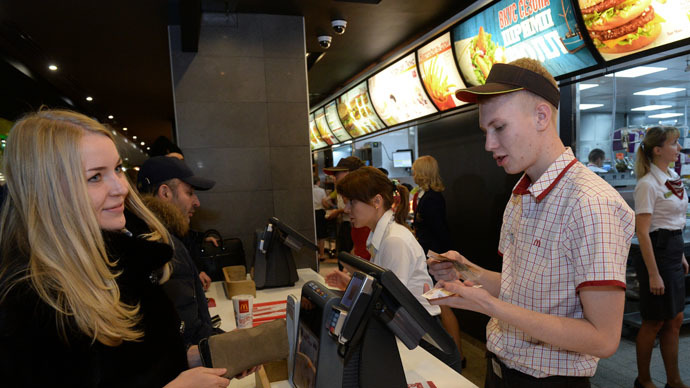New bill to equate fast food with vodka in advertising

Russian lawmakers are promising to draft a bill that would render it almost impossible to promote foodstuffs with high sugar, salt and saturated fat content, saying the move would help to encourage healthy food habits among the population.
MP Vasiliy Shestakov of the majority United Russia party has told the Kommersant Daily that in the near future he plans to draft several amendments to federal laws on advertising that would seriously restrict the advertising of sugar-containing sodas, sweets, margarine, potato chips, some types of sausages and many types of fast food.
The amendments would see fast food and alcohol ads as equal threats, Shestakov said in comments. He added that harmful fast food was a threat to the apparently healthy “national foods.”
READ MORE: Activist pushes for govt anti-junk food media blitz
The draft would give detailed information on maximum allowed content of sugar, salt and saturated fat in advertised products. If the standards aren’t met, the foodstuffs will be banned from advertising in press, TV and radio programs broadcast between 7pm and 10pm and in all media targeted at children. The draft also bans outdoor advertising of potentially harmful foods in most public places and various BLT events promoting such products.
The Kommersant daily says that once passed the initiative could seriously damage the advertising industry. According to the newspaper, revenues from makers of sugary and fatty foods make up to 8 percent of advertising budgets on federal television. A representative of Vi, a leading seller of advertising space in Russia, has told Kommersant that soft drinks and fast food ads chalk up about 2.5 percent of all television advertising in the country, an estimated 4.5 - 5 billion rubles in 2015 ($80 – $89 million).
The head of the Russian Association of Ad Placers, Fyodor Borisov, has said that the members of his group have already imposed certain restrictions on themselves as a self-regulating measure and there was no need for any legislative amendments. He said that in 2009 the organization decided to target soft drink ads at children of 12 and under.
READ MORE: Foreign booze, tobacco, soda in Communists’ sanction sights ‘to protect Russian genes’
Russian lawmakers have already proposed restrictions on potentially hazardous foods. In June, the head of Russia’s Party of Pensioners urged the government to impose sanctions on the Coca-Cola and PepsiCo companies, saying they were major sponsors of anti-Russian politicians in the US and that the move would boost domestic producers of soft drinks.
The Communist Party has also sought an additional tax on sugar-containing drinks quoting concern over national health. The Russian Temperance Society has asked the government to launch a major nationwide campaign against fast food and sugar-containing sodas, similar to the existing anti-alcohol and anti-tobacco campaigns.












